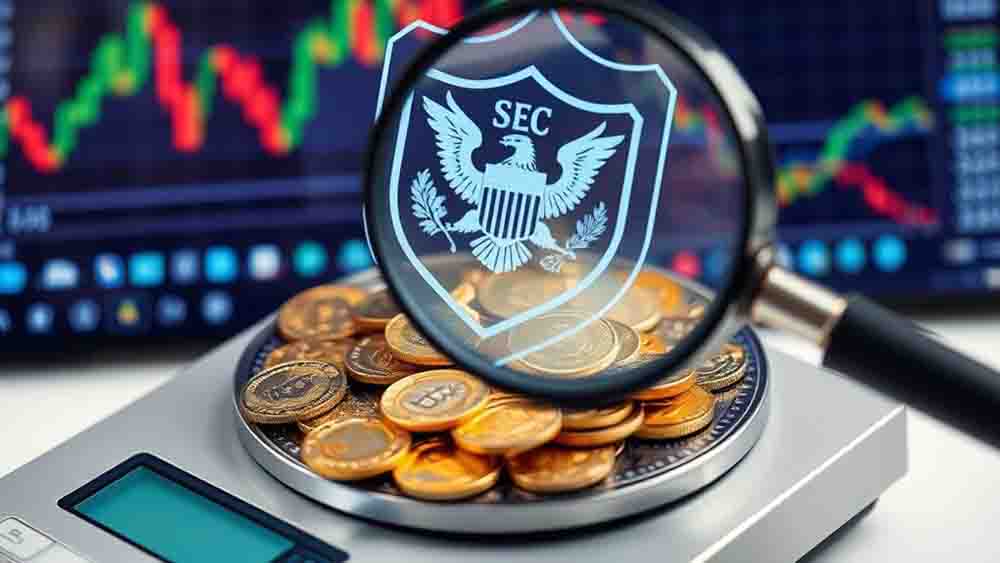What Are SEC’s Crypto Rules for Digital Assets?
Note: This post may contain affiliate links, and we may earn a commission (with No additional cost for you) if you purchase via our link. See our disclosure for more info. The gold and crypto world is constantly changing. This is not financial, investment, legal, or professional advice. So, please verify the information on the gold and cryptocurrency provider’s websites.
Click below and listen to the podcast on this page.
You've likely heard about the SEC's involvement in regulating cryptocurrencies. But, you may not know the specific crypto rules they set. The SEC is very interested in digital assets. It is focused on classifying them as securities or commodities. This classification has far-reaching implications for issuers, traders, and investors alike. If you're in the crypto space, you must know these rules. Non-compliance can lead to severe penalties. What are these regulations? How might they affect your crypto activities? The answers may surprise you.
Key Takeaways
- The SEC uses the Howey Test to classify digital assets as securities or commodities, with most cryptocurrencies falling under securities.
- Digital asset offerings must register with the SEC unless exempted, providing detailed financial and risk disclosures.
- Crypto trading platforms must register as national securities exchanges or alternative trading systems to operate legally.
- The SEC actively monitors for market manipulation and fraud, imposing minimum standards and cybersecurity measures on regulated entities.
- Enforcement actions have increased, with penalties for non-compliance including fines, trading suspensions, and formal charges against violators.
SEC's Approach to Crypto Classification
Regulators at the SEC have taken a measured approach to classifying cryptocurrencies, relying heavily on the Howey Test to determine whether a digital asset qualifies as a security. This test evaluates factors such as control structures and investor expectations, helping the SEC establish regulatory oversight for crypto assets.
The SEC's classification process aims to protect investors while managing the complexities of emerging digital assets. For example, Bitcoin is categorized as a commodity due to its decentralized nature, whereas other cryptocurrencies may be deemed securities under existing laws.
Key aspects of the SEC's approach include:
- Applying the Howey Test to evaluate crypto assets
- Differentiating between commodities and securities
- Utilizing existing laws to regulate digital assets
The SEC's cautious stance reflects the need for regulatory clarity in the rapidly evolving crypto landscape. While specific disclosure standards for crypto enterprises aren't yet finalized, general principles from the Securities Act of 1933 and the Exchange Act of 1934 still apply.
Ongoing legal challenges, such as the Ripple case, highlight the complexities of classifying digital assets. These cases underscore the SEC's commitment to maintaining investor protection while adapting to the unique characteristics of cryptocurrencies.
Registration and Disclosure Requirements
If you're involved in digital asset offerings, you'll need to understand the SEC's classification criteria for securities and comply with filing and reporting obligations.
The SEC uses the Howey Test to determine if a digital asset qualifies as a security, considering factors like investment of money and expectation of profits.
You'll be required to register your offering with the SEC and provide detailed disclosures unless you qualify for an exemption, with non-compliance potentially resulting in severe penalties.

Securities Classification Criteria
In light of the evolving crypto landscape, the Securities and Exchange Commission (SEC) has intensified its focus on classifying digital assets as securities. The primary tool used for this classification is the Howey Test, which evaluates factors such as investment of money, common enterprise, and expectation of profits from others' efforts.
Understanding the SEC's securities classification criteria is essential for crypto enterprises and investors alike. If a digital asset is deemed a security, it must comply with stringent registration requirements and disclosure regulations. This classification triggers obligations under the Securities Act of 1933, mandating the disclosure of financial and operational information to protect investors.
Key points to take into account:
- The SEC's approach to crypto regulations is evolving, with recent enforcement actions against companies like Ripple and Coinbase highlighting the importance of compliance.
- Unregistered offerings face increased scrutiny, emphasizing the need for careful evaluation of registration requirements.
- Financial advisors must stay informed about regulatory changes to fulfill their fiduciary duty and protect clients from potential harm in crypto investments.
Filing and Reporting Obligations
Three key obligations form the backbone of the SEC's filing and reporting requirements for digital assets classified as securities.
First, issuers must register their offerings with the SEC before selling or offering them to the public. This guarantees compliance with existing securities laws and protects investors.
Second, companies must provide detailed disclosure documents to potential investors. These filings include extensive information about the business, its financial condition, and associated risks. The Securities Act of 1933 mandates these disclosures to promote transparency and informed decision-making.
Third, firms engaging in crypto-related activities must conduct thorough due diligence to stay informed about their regulatory obligations. This involves understanding the Howey Test, which the SEC uses to determine if a digital asset is a security based on factors such as investment of money in a common enterprise with profit expectations.
Failure to meet these filing and reporting obligations can result in severe consequences.
The SEC has increased its scrutiny and enforcement actions against non-compliant companies, as seen in cases involving Kraken and Nexo Capital. To avoid penalties and protect investors, it's vital for issuers to prioritize adherence to these requirements.
Trading and Exchange Regulations
As you navigate the crypto landscape, you'll find that the SEC's trading and exchange regulations are designed to protect investors and maintain market integrity.
These rules include strict registration requirements for platforms that facilitate the trading of crypto assets classified as securities.
You'll also encounter measures aimed at preventing market manipulation and enhancing investor protection, such as mandatory disclosures and trading surveillance systems.

Registration Requirements
Under the SEC's regulatory framework, crypto assets deemed securities must navigate a complex landscape of registration requirements. The SEC mandates that these assets be registered before they can be offered and sold to the public, guaranteeing compliance with existing securities laws. This process is designed to promote transparency and protect investors while maintaining market integrity.
Companies dealing with crypto assets classified as securities must adhere to registration requirements under the Securities Act of 1933. Additionally, they may be subject to the Exchange Act of 1934.
These regulations apply to:
- Crypto assets classified as securities
- Trading platforms facilitating transactions involving securities
- Companies offering or selling crypto assets to the public
To legally operate, trading platforms must register as national securities exchanges or alternative trading systems (ATS) with the SEC. The registration process emphasizes proper disclosures and transparency to safeguard investors' interests.
Recent enforcement actions by the SEC, such as those against Kraken and Nexo Capital Inc., highlight the consequences of non-compliance.
These cases underscore the importance of adhering to registration requirements and the potential legal ramifications for unregistered offerings in the crypto space. By following these regulations, companies can guarantee they're operating within the bounds of securities laws and avoiding potential penalties.
Market Manipulation Prevention
Market manipulation in the crypto world is a constant threat, and the SEC's watchful eye never blinks. The commission actively monitors social media and trading activities to detect potential market manipulation, demonstrating its commitment to maintaining market integrity in the crypto space. Enhanced scrutiny is placed on firms handling crypto assets due to rising cyber threats, with regulatory obligations demanding robust risk assessment and incident response plans.
To protect investors and guarantee market integrity, the SEC may suspend trading during investigations into potential fraud or market manipulation. The commission's authority extends to regulating crypto trading platforms, imposing minimum standards to prevent market manipulation and guarantee liquidity.
| SEC Actions | Purpose | Impact on Investors |
|---|---|---|
| Social media monitoring | Detect manipulation | Increased protection |
| Enhanced scrutiny | Assess cyber risks | Improved security |
| Trading suspensions | Investigate fraud | Swift investor protection |
| Exchange regulation | Guarantee liquidity | Stable trading environment |
| Enforcement actions | Target fraudulent schemes | Reduced risk exposure |
The SEC's enforcement actions have increasingly targeted fraudulent schemes and misrepresentations in the crypto market. This heightened focus on trading platforms and offerings aims to safeguard investors and maintain the integrity of the rapidly evolving crypto asset landscape.

Investor Protection Measures
Investors in the crypto world face unique challenges, prompting the SEC to implement robust protection measures. The agency's focus on investor protection has led to increased enforcement actions, with a 53% rise in 2023 alone. This heightened scrutiny aims to guarantee that trading platforms and exchanges comply with existing securities laws, emphasizing proper registration and adherence to regulatory standards.
To safeguard investors‘ interests, the SEC has implemented several key measures:
- Categorizing most cryptocurrencies as securities, subject to existing securities laws
- Requiring registration of crypto offerings and exchanges
- Enforcing compliance through charges against non-compliant firms
- Mandating enhanced cybersecurity measures for regulated entities
- Investigating market manipulation and insider trading
These measures are designed to protect investors from fraud, theft, and market manipulation in the rapidly evolving crypto landscape.
The SEC's enforcement actions against firms like Kraken and Nexo Capital underscore the importance of compliance with registration requirements. By focusing on crypto assets, digital assets, and trading platforms, the SEC aims to create a more secure environment for investors.
Compliance with these regulations is vital for both investors and platforms to navigate the complex world of cryptocurrencies safely and legally.
Investor Protection Measures
Watchdogs at the SEC have ramped up their efforts to protect investors in the volatile crypto market. The agency's commitment to safeguarding investors is evident in its 53% increase in enforcement actions in 2023.
These actions target fraud, misrepresentation, and market manipulation in the crypto space, ensuring that digital asset securities comply with existing securities laws.
The SEC applies the Howey Test to determine if crypto assets qualify as securities, triggering registration requirements and disclosure obligations. This approach aims to provide investors with essential information for informed decision-making.
To further support investor education, the SEC's Investor Advocate offers resources and alerts about the risks associated with crypto investments.
Key aspects of the SEC's investor protection measures include:
- Enforcing compliance with securities laws for applicable crypto assets
- Investigating and prosecuting fraudulent schemes and market manipulation
- Requiring proper registration and disclosure for digital asset securities
- Educating investors about crypto-related risks and investment considerations

Enforcement Actions and Penalties
Enforcement actions and penalties form the backbone of the SEC's regulatory approach to crypto. In 2023, the SEC ramped up its efforts, increasing enforcement actions by 53% and targeting 46 crypto firms for regulatory violations. These actions have resulted in over $1 billion being raised through fraudulent offerings, highlighting the need for stringent oversight in the digital asset space.
The SEC's enforcement procedure includes:
- Investigation of potential violations
- Issuing warnings to non-compliant firms
- Providing a Wells notice for firms to respond
- Filing formal charges if necessary
- Imposing penalties and requiring corrective actions
High-profile cases involving Binance, Coinbase, and Terraform Labs underscore the SEC's commitment to cracking down on unregistered securities and fraudulent activities in the crypto sector.
A 2024 FINRA study revealed that 70% of crypto-related communications violated rules, further emphasizing the importance of compliance.
As an investor, you should be aware that the SEC's enforcement actions aim to protect you from fraudulent offerings and guarantee transparency in the crypto market.
Future Regulatory Developments
Uncertainty looms over the future of crypto regulation as the SEC grapples with evolving market dynamics and legal challenges.
The regulatory landscape for digital assets is in flux, with recent court rulings potentially reshaping how cryptocurrencies are classified. The SEC's approach to crypto assets may shift, particularly in light of the Ripple case decision.
Future SEC regulations are expected to focus on:
- Establishing specific disclosure standards for crypto enterprises
- Adapting existing rules to address the growing interest of financial advisors in the crypto market
- Enhancing investor protection in digital asset securities
The potential end of Chevron deference could limit the SEC's authority to define securities, leading to increased challenges in regulating digital assets.
This may result in a more complex regulatory environment for crypto companies and investors alike.
As the financial markets continue to evolve, you can expect the SEC to refine its approach to crypto regulation.
This may include:
- Clearer guidelines for classifying digital assets
- Stricter enforcement actions against non-compliant entities
- Improved transparency requirements for crypto companies
Stay informed about these developments to navigate the changing regulatory landscape effectively.

Frequently Asked Questions
What Is the SEC Regulation for Crypto?
The SEC's regulation for crypto is based on existing securities laws.
You'll find that most cryptocurrencies are considered securities, subject to the Securities Act of 1933 and the Exchange Act of 1934.
The SEC uses the Howey Test to determine if a digital asset qualifies as a security.
They've increased enforcement actions by 53% in 2023, showing a strict approach to compliance.
As an advisor, you must stay informed about these regulations and conduct thorough due diligence to protect your clients.
What Are the SEC Custody Rules for Crypto?
The SEC's custody rules for crypto assets require custodians to protect client funds and comply with securities laws.
You'll find that these rules emphasize:
- Clear disclosures about custody practices and risks
- Robust cybersecurity measures to safeguard assets
- Due diligence by investment advisors when selecting custodians
Firms must adhere to these regulations or face potential enforcement actions.
The SEC's focus on crypto custody reflects the growing importance of digital assets and the need to guarantee investor protection in this evolving financial landscape.
What Is the Howey Test for Digital Assets?
The Howey Test is an important tool you'll encounter when dealing with digital assets.
It's used to determine if your crypto asset is a security. You'll need to evaluate four key elements:
- Did you invest money?
- Is there a common enterprise?
- Do you expect profits?
- Do these profits come from others' efforts?
If your digital asset ticks all these boxes, it's likely a security.
This classification means you'll face SEC regulations and compliance requirements.
Understanding the Howey Test is essential for maneuvering the crypto regulatory landscape.
What Is the SEC on Digital Assets?
The SEC's stance on digital assets is evolving.
They've categorized most cryptocurrencies as securities, applying existing laws to the crypto space. You'll see increased enforcement actions targeting unregistered offerings and fraud.
The SEC's approved crypto futures and spot ETFs, signaling a shift in approach. They're using the Howey Test to determine if digital assets qualify as securities.
Ongoing litigation, like the Ripple case, is shaping their regulatory authority. The SEC emphasizes compliance with securities laws for crypto issuers and companies.
Conclusion
You've seen how the SEC's crypto rules aim to protect investors and maintain market integrity. The SEC is working to bring order to crypto. It is classifying digital assets, enforcing registration, and regulating trading platforms. While challenges remain, these rules are evolving to address crypto's unique aspects. Stay informed about these rules. They will shape the future of digital asset investing and trading.











